1. Educational Qualifications: Candidates should have completed their 10+2 education from a recognized educational board.
2. Stream: Students from any stream (Science, Commerce, or Arts) can opt for a forensic science course. However, having a science background with subjects like Physics, Chemistry, and Biology can be advantageous.
3. Minimum Marks: Many institutions require candidates to have a minimum aggregate score in their 10+2 examinations (usually around 50-60%). However, specific institutions may have their own eligibility criteria, so it's important to check with the respective universities or institutes.
Skills Required:
To succeed in the field of forensic science, certain skills are essential. These include:
1. Attention to Detail: Forensic scientists must have a keen eye for detail and the ability to observe, analyze, and document evidence accurately.
2. Analytical and Critical Thinking: Strong analytical and critical thinking skills are necessary to analyze complex evidence, draw logical conclusions, and solve intricate forensic puzzles.
3. Scientific Aptitude: A solid foundation in scientific principles, such as chemistry, biology, physics, and mathematics, is important to understand and apply scientific methodologies in forensic investigations.
4. Communication Skills: Effective written and verbal communication skills are crucial for preparing comprehensive reports, presenting findings, and collaborating with legal professionals, investigators, and colleagues.
5. Problem-Solving Abilities: Forensic scientists often encounter challenging and unique situations. They need to be able to think creatively and develop innovative solutions to complex problems.
6. Ethical and Professional Conduct: Forensic scientists must adhere to strict ethical guidelines, maintain professional integrity, and handle evidence with the utmost care and confidentiality.
7. Teamwork and Collaboration: Collaboration with law enforcement agencies, legal professionals, and other forensic experts is essential in the field of forensic science. Forensic scientists should be able to work effectively as part of a team.
Here are some of the top colleges in India known for their forensic science programs:
1. National Forensic Sciences University, Gandhinagar
2. Amity Institute of Forensic Sciences, Noida
3. Gujarat Forensic Sciences University, Gandhinagar
4. Osmania University, Hyderabad
5. Lovely Professional University, Jalandhar
6. University of Delhi, Delhi
7. Punjabi University, Patiala
8. Manipal University, Manipal
9. Dr. Harisingh Gour Vishwavidyalaya, Sagar
10. Sam Higginbottom University of Agriculture, Technology and Sciences, Allahabad
These institutions offer undergraduate and
postgraduate programs in forensic science, providing comprehensive education and practical training in various aspects of the field. It's important to research the specific courses, faculty, infrastructure, and placements of each institution to find the one that aligns with your interests and aspirations. Additionally, check their accreditation and reputation within the field of forensic science.

